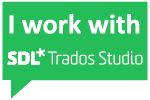|
How do I translate |
|
|
To put it briefly, I have been devoted to translations...
Unless I am working on a very urgent order, I always take the time to
get an overall impression of the text first. I am trying to capture the
main message and the means of expression used. Whether the text uses
formal or informal language, I always do my best to ensure that it is
easy to understand for its addressees.
An important part of my work as a translator is using appropriate collocations. It often requires a lot of proficiency in the language to choose the right phrase...
Let's take an easy example. If we hear a word collocation "hard rain" in
English, it sounds rather unnatural to us. With a little effort, we can
get its meaning, but we feel that the suitable English collocation here
would be "heavy rain". As for the right Czech equivalent of this word
collocation, we should say "silný dé¹»". A word phrase "tì¾ký dé¹»"
would sound similarly unnatural for Czechs as the English "hard rain".
Correct word order
To make the translation easier to understand, it is often desirable to
modify the word order of some sentences. English shows
significant affection for moving certain word elements to the beginning
of a sentence – these are various kinds of adverbials as well as gerunds
that replace subordinate clauses. It is quite a usual method in written
English, greatly facilitating orientation in the text for the readers.
The Czech word order is, on the contrary, a little looser, which
sometimes make it even more difficult to choose the best position of
particular phrases. In this respect the translator's job can never
be fully replaced by machine translation tools, such as Google
Translate or Bing Translator.
As regards to technical translations, it is
vital to maintain the correct technical terminology. As a
graduate of the humanities, I cannot claim to be an expert in the
terminology of all the disciplines; however, I have quality
translator's dictionaries at my disposal from the fields of
technology, law, economics and medicine, in which I am able to look
up the correct terms.
If you are interested in translations of
legal agreements or technical manuals for ordinary users,
you need not worry to entrust me with the job. Your English-Czech as
well as Czech-English translations will be in good hands with me. I will
always provide you with a brief glossary of the terminology
used and, in case of any doubt, I will try to consult the terms with
you.
However, it can make a difference if you demand a translation of a
highly professional text that requires deeper insight in
a
respective
field – in such a case you should better assign the translation to
someone with an expert knowledge.
There is more to translation than just...
The translation is not just a matter of correct word order, suitable
collocations and proper technical terminology. It is also necessary to
pay attention to correct spelling, punctuation and typography. When
translating into English, we also have to use the proper verb tenses,
definite/indefinite articles and other grammatical categories.
But, in the first place, we have to bear in mind that the translation is
never just a mechanical transfer from one language into another. An
important part of my translator’s job is to avoid possible narrowing
or broadening of the meaning of the original message. And last but
not the least, I always try to compose the cultural differences of
both the countries into the translation.
|
Libor Zukal
Mi¹ákova
454/16 Czechia
Business ID: 76511766 VAT: CZ7809184482
mobile: (+420) 799 797 165 Skype: libor.zukal
|
 A
good dictionary of English collocations is an indispensable aid
in my work in which I can check the suitable phrases. My next steps then
usually lead to the Internet – I am entering the word collocations into
the search engine, trying to find out how (and how often) they appear on
various British and American websites.
A
good dictionary of English collocations is an indispensable aid
in my work in which I can check the suitable phrases. My next steps then
usually lead to the Internet – I am entering the word collocations into
the search engine, trying to find out how (and how often) they appear on
various British and American websites.
